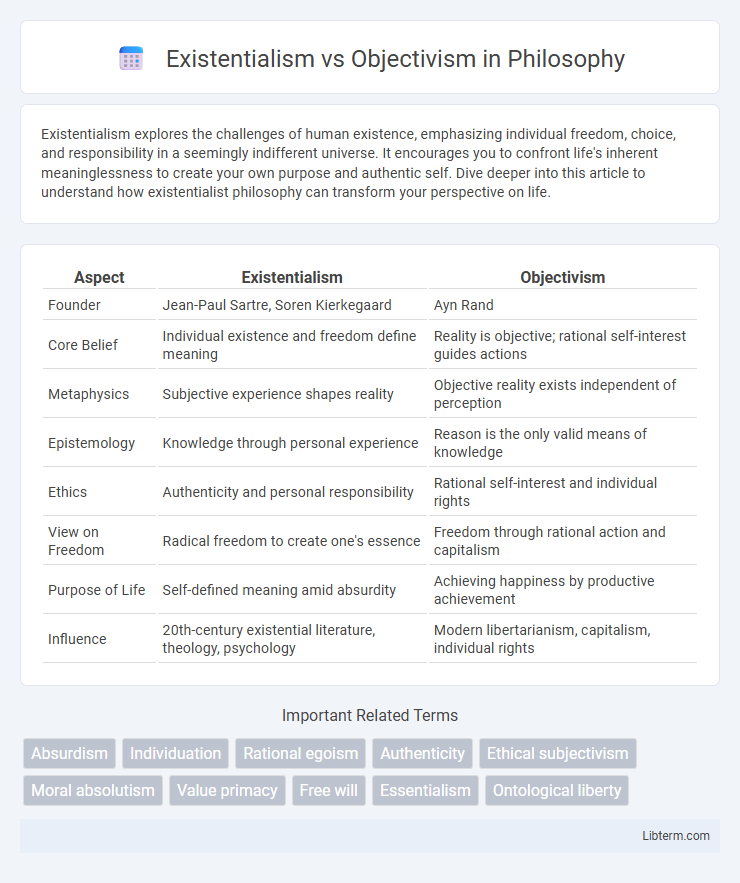Existentialism explores the challenges of human existence, emphasizing individual freedom, choice, and responsibility in a seemingly indifferent universe. It encourages you to confront life's inherent meaninglessness to create your own purpose and authentic self. Dive deeper into this article to understand how existentialist philosophy can transform your perspective on life.
Table of Comparison
| Aspect | Existentialism | Objectivism |
|---|---|---|
| Founder | Jean-Paul Sartre, Soren Kierkegaard | Ayn Rand |
| Core Belief | Individual existence and freedom define meaning | Reality is objective; rational self-interest guides actions |
| Metaphysics | Subjective experience shapes reality | Objective reality exists independent of perception |
| Epistemology | Knowledge through personal experience | Reason is the only valid means of knowledge |
| Ethics | Authenticity and personal responsibility | Rational self-interest and individual rights |
| View on Freedom | Radical freedom to create one's essence | Freedom through rational action and capitalism |
| Purpose of Life | Self-defined meaning amid absurdity | Achieving happiness by productive achievement |
| Influence | 20th-century existential literature, theology, psychology | Modern libertarianism, capitalism, individual rights |
Introduction to Existentialism and Objectivism
Existentialism explores individual freedom, choice, and subjective experience as the foundation of human existence, emphasizing authenticity and personal responsibility amidst an inherently meaningless world. Objectivism, founded by Ayn Rand, promotes rational self-interest, objective reality, and laissez-faire capitalism as the means to achieve human happiness and reason-based ethics. Both philosophies address the nature of existence but diverge in their views on reason, morality, and the role of the individual in shaping life's purpose.
Core Philosophical Foundations
Existentialism centers on individual freedom, choice, and subjective experience, emphasizing the inherent meaninglessness of life that must be confronted by creating personal values. Objectivism, founded by Ayn Rand, upholds rational self-interest, objective reality, and the pursuit of happiness as moral imperatives, asserting that reality exists independent of consciousness. Both philosophies address human existence but diverge fundamentally in their views on truth, ethics, and the nature of reality.
Key Figures and Historical Context
Existentialism, championed by key figures like Jean-Paul Sartre and Simone de Beauvoir during the mid-20th century post-World War II era, emphasizes individual freedom, choice, and authenticity in an absurd or indifferent universe. Objectivism, founded by Ayn Rand in the mid-20th century amidst the rise of collectivist ideologies, promotes rational self-interest, objective reality, and laissez-faire capitalism as core principles. These philosophies emerged as responses to the social and political upheavals of their time, shaping distinct views on human existence and ethics.
Concept of Reality: Subjective vs Objective
Existentialism emphasizes a subjective concept of reality, asserting that individuals create meaning through personal experience and choice, leading to a fluid and personal understanding of existence. Objectivism, founded by Ayn Rand, maintains an objective reality independent of human perception, where facts and truths exist regardless of individual beliefs or emotions. This fundamental divergence highlights existentialism's focus on internal, personal reality versus Objectivism's commitment to an external, absolute reality.
Individualism: Freedom vs Reason
Existentialism emphasizes individual freedom, asserting that people create their own meaning through authentic choices in an inherently absurd universe. Objectivism prioritizes reason as the guiding principle for individual action, promoting rational self-interest and objective reality as foundations for freedom. Both philosophies value individualism but differ fundamentally in their sources of freedom: existentialism champions subjective freedom, while Objectivism upholds freedom through rational understanding.
Ethics and Moral Responsibility
Existentialism emphasizes individual freedom and personal responsibility, asserting that moral values are subjective and must be created authentically by each person through their choices. Objectivism, founded by Ayn Rand, promotes rational self-interest and objective reality as the basis for ethics, advocating that moral responsibility arises from pursuing one's own happiness without sacrificing others. Both philosophies place responsibility at the core of ethics but differ fundamentally on whether moral values are independently derived or individually constructed.
The Meaning of Life: Absurdity vs Purpose
Existentialism emphasizes the absurdity of life, asserting that individuals must create their own meaning in a universe without inherent purpose, as famously explored by philosophers like Albert Camus and Jean-Paul Sartre. Objectivism, founded by Ayn Rand, argues that life has an objective purpose based on rational self-interest and individual achievement, stressing the pursuit of personal happiness as the ultimate goal. These contrasting views highlight existentialism's focus on subjective meaning-making amid absurdity versus Objectivism's assertion of an objective, reason-based life purpose.
Society and Human Relationships
Existentialism emphasizes individual freedom, authentic choices, and personal responsibility, arguing that society shapes human relationships through subjective meaning and authentic self-expression. Objectivism, founded by Ayn Rand, promotes rational self-interest and capitalism, advocating that healthy human relationships are based on mutual benefit and objective reality rather than emotional or societal pressures. Both philosophies diverge in their view of society, with existentialism highlighting personal meaning within social constructs, while objectivism prioritizes objective principles and individual rights in social interactions.
Criticisms and Common Misconceptions
Existentialism is often criticized for its perceived subjectivism and lack of clear ethical guidelines, leading to misconceptions that it promotes nihilism or moral relativism; however, existentialists emphasize authentic individual choice and responsibility. Objectivism faces criticism for its rigid emphasis on rational self-interest and capitalism, which some argue neglects social welfare and communal values, often misunderstood as advocating selfishness without regard for others. Both philosophies are frequently oversimplified, obscuring the nuances of existentialist freedom and objectivist rational egoism.
Conclusion: Bridging or Contrasting Philosophical Paths
Existentialism and Objectivism offer contrasting yet occasionally complementary perspectives on human existence and purpose. Existentialism emphasizes individual freedom, subjective meaning, and authentic choice in an inherently absurd world, while Objectivism advocates reason, objective reality, and rational self-interest as the basis for ethical living. Bridging these philosophies requires acknowledging the existential focus on personal experience alongside Objectivism's commitment to logical principles and objective values.
Existentialism Infographic

 libterm.com
libterm.com